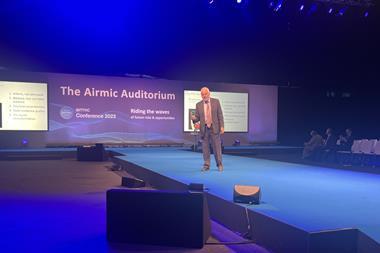In response to new corporate governance requirements {Turnbull) and recent events, Railtrack has formalised its risk management approach by setting up a risk review group to lead and co-ordinate the risk management activities of the company, acting finance director Sebastian Bull told those attending AIRMIC's annual dinner in December. "We are currently at the point where, having identified the key risks, champions have been identified to progress a more detailed analysis and management plan," he said.
Bull took the opportunity to thank the insurance industry for its swift, professional and sensitive reponse to the Hatfield and Ladbrook Grove incidents. "I would like to acknowledge the support of the insurance industry in responding to and dealing with the hundreds of claims that are now being progressed." He also highlighted the success of the claims allocation and handling agreement contractual regime (CAHA) which dictates the railway industry's consolidated response to third party claimants. "Complex as it is, it has worked very effectively and I would like to thank the insurance industry for its part in supporting this structure."
Bull went on to say: 'The railway industry has been shaken to the core by these tragic events. It will be of no comfort to the victims and relatives of those who were involved in these terrible accidents, but statistically rail travel is still one of the safest fomns of transport. We have learnt tough lessons from these tragedies and must now create a safer and better railway. I regret that many of you here tonight will be experiencing a period of significant disruption to services. Delays will continue for a little longer, but it is vital that the work being undertaken is completed.
"Regrettably, we cannot guarantee that incidents will not occur in the future, as risk is associated with any transport system. Our job is to ensure that risk is minimised to the greatest practical extent. We are determined that the lessons learned will contribute to a safer, bigger and better railway. Risk management has a key role to play in this challenge. At Railtrack, we will be doing our best to adopt a constructive and evolving risk management strategy and it is good to know that AIRMIC will support us in this.
"An issue that Railtrack is currently facing, and one no doubt encountered by many other companies, is how to embed an ongoing risk management culture which is a part of, rather than apart from, the day to day running of the business. We are still developing our thinking in this respect and I understand that AIRMIC is working on guidelines that may assist."
Bull said that, like many other industries, the rail transport sector had become increasingly aware of the need for better risk management systems and practice, incorporated within good corporate governance of the organisation. Significant progress had been made already, and the drive for improvement would be continuous. One example of how Railtrack has been trying to expand its knowledge and experience of risk management was in the appointment last year of Alan Fleming, as Railtiack head of insurance and risk management. Fleming has been helping Railtrack develop its risk culture.
As the current AIRMIC chairman, Fleming responded to Sebastian Bull's speech, and was able to draw from his own experience during a distinguished career with companies such Diageo, Guinness and ICI, to highlight the fact that other industries have also suffered setbacks such as Railtrack was currently experiencing. As those other industries did, he felt confident that Railtrack and the rail travel sector would respond positively.
Fleming also referred to CAHA. "This allowed the industry and its insurers to get on with the job of dealing with the claimants in a swift and reasonable way without incurring horrendous lawyers' fees," he said. "I believe that a similar claims protocol where, by prior agreement, the insurance industry, in the early stages of a disaster, rallies round a lead party which deals with the immediate aftermath without prejudice to liability, could greatly benefit other commercial sectors and industries."



















